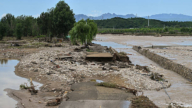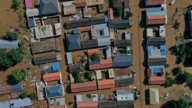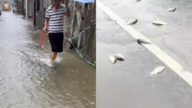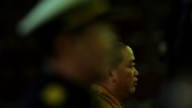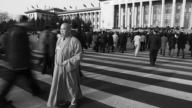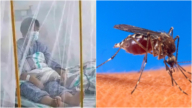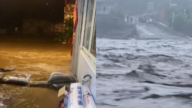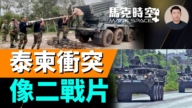【新唐人2014年12月27日讯】最近一年多来,随着中共当局对新疆地区的高压维稳政策不断升级,越来越多的维吾尔族人试图越过边境,逃往东南亚国家避难,但多数遭到了境内外警方拦截。日前,广西警方在中越边界抓捕了20多名维吾尔人,并枪毙了其中一人,还将他们称为“宗教极端份子”。那么,外界是如何看待当局的这一说法呢?
据中共喉舌媒体《央视》报导说,中共警方12月21号晚上,在中越边境处破获一起“宗教极端分子”偷越边境,逃往越南的案件,过程中击毙一人,拘捕21人。而《央视》在报导这一事件时,并没有具体说明这些“宗教极端份子”来自什么地区。
英国广播公司《BBC》的报导认为,这22名试图越境的中国人应该来自新疆,是维吾尔族穆斯林。
总部在德国的世界维吾尔大会发言人迪里夏提表示,这些试图逃离中国的人,并不是当局口中所谓的“宗教极端份子”,而是因为承受不住中共的高压政策,被迫背井离乡的维吾尔族人民。
世界维吾尔大会发言人阿里木则呼吁,希望中国民众不要相信当局欺骗抹黑式的洗脑宣传,而对维吾尔人产生误解。
世界维吾尔大会发言人阿里木: “最近我们看到有很多维吾尔族难民他们去东南亚国家,泰国、越南、缅甸、马来西亚等国。中国政府把这些维族人声称为所谓的‘极端份子’、‘恐怖份子’、‘分裂份子’之类的。但事实上不是如此,因为我们看到这些离开自己国土和家园的维族人,不仅仅是所谓的年轻人,我们看到的是很多家人,他们有丈夫有妻子,有一两岁、三四岁的孩子。”
据《自由亚洲电台》引述“维吾尔人全工程”资深研究员亨利克•萨斯耶夫斯基的观点指出,中共当局不经任何法律程序就把逃离中国的维吾尔人说成是“宗教极端份子”,使人质疑其目的,很可能是为了给中国警察击毙其中一人提供辩解的借口。亨利克甚至怀疑,中国警察向这些人使用了不适当的、过度的、非法的武力。
对此,几年前为躲避当局迫害而被迫偷渡到泰国的谭伟昌,也提出了同样看法。
流亡泰国的难民谭伟昌: “它这个所谓‘宗教极端份子’是个口袋罪,很宽泛的一个概念,它就像‘泄露国家机密’、还有‘寻衅滋事’这种罪名,它很模糊,没有精确的指出是什么东西,中共经常利用这个来打击各种类型的,它认为的‘敌人’或者是对它‘不利’的人。”
最近几年,有越来越多的维吾尔人通过寮国和缅甸,前往泰国或其他东南亚国家,以躲避当局的迫害。据《自由亚洲》报导,目前在泰国境内,已经有超过300名来自中国的维吾尔人等待难民身份,再转往第三国。
谭伟昌告诉《新唐人》记者,几年前在泰国境内,几乎看不到维族人申请难民,但是最近一段时间,前往泰国申请难民的维吾尔人明显增加。
谭伟昌:以前我在曼谷的时候,确实没怎么听说过有维族人进入泰国来申请难民,但是近来就看到至少有两例,特别是前段时间,泰国说拘禁了100多名维吾尔人那个案例,从这个角度来看,我觉得实际上这个迫害更加严重,新疆当地的宗教迫害是加剧了。”
印尼华侨黄安明先生在印尼排华期间回到大陆后,反遭中共当局迫害,不得不再次逃到了泰国。他表示,即使维吾尔族人顺利到达泰国,也并不意味他们安全了。据了解,虽然泰国在过去几十年中接受过上百万难民,但实际上泰国并不是1951年的难民公约签署国,难民身份在泰国是不被承认和保护的,而且随时面临被逮捕和遣返的危险。
在泰国避难的原印尼华侨黄明安:“现在有些(难民)已经抓进了拘留中心 (维吾尔人)被抓了两次了,但是那些人都是在南部被抓的 他们两次(偷渡)进来到了南部的一个(聚集)点。那些警察去包围去把他们抓了,抓了两批人。”
据《BBC》报导,在泰国总理巴育访问中国之际,中共外交部于12月24号发表了中泰联合新闻公报,其中提到,两国将进一步加强“预防和根除”有组织偷渡等打击跨国犯罪的合作。这一消息对于那些试图逃离中共当局迫害和暴政的人来说,无疑是雪上加霜。
采访/陈汉 编辑/张天宇 后制/萧宇
Regime Shot and Killed a Uyghur Extremist
High pressure stability maintenance policy has been ever
increasing in Xinjiang;
subsequently causing many more Uyghurs to try to cross
the borders seeking asylum in Southeast Asian countries.
Many of them have been intercepted by police from both sides.
Recently, Guangxi police arrested more than 20 Uyghurs
at the Vietnam border and shot one dead.
Police claimed they are “religious extremists."
But, how was this incident viewed by the outside world?
According to the Chinese Communist Party (CCP) mouthpiece,
CCTV, one religious extremist group was cracked down by police
while trying to cross the Sino-Vietnam border
on the evening of Dec. 21.
Police shot one man dead and arrested 21.
CCTV provided no specific information
about where these extremists were from.
BBC Chinese suspected they are Uyghurs
from China’s far western region of Xinjiang.
World Uyghur Congress spokesman Dilshat Reshit believes
these are Uyghurs who could not stand the CCP’s
high-handed policy and were forced to flee China,
rather than so-called “religious extremists".
World Uyghur Congress spokesman Alim Seytoff also appealed
to the Chinese people not to trust the misleading propaganda
of the CCP that aims to discredit the Uyghurs
and brainwash the Chinese.
Alim Seytoff: “We have seen many Uyghurs take refuge
in Southeast Asian countries such as Thailand, Vietnam,
Myanmar and Malaysia recently.
The Chinese government claims they are all so-called
“extremists", “terrorists", “separatists" and the like.
But in fact we saw these people who left their land and homes
are many younger generations and groups of families
of husband and wife, with infants and toddlers."
Uyghur Human Rights Project senior researcher
Henryk Szadziewski, believed the regime has labeled
this person a religious extremist
in order to cover the police tracks.
He also suspected Sunday’s shooting death might have been
an “extrajudicial killing" by Chinese authorities
with excess and unreasonable force, according to RFA.
In this regard, a refugee in exile in Thailand shares
a similar point of view.
Chinese refugee in Thailand, Tan Weichang: “This ‘religious
extremists’ is a pocket crime with a very broad concept.
It is similar to charges such as “leaking state secrets"
and “picking quarrels and provoking troubles."
They are very vague.
The CCP has often used these charges to defeat its so-called
enemy or person to its disadvantage.
In recent years, many more Uyghurs have escaped
the persecution by going through Laos or Myanmar
to reach Thailand or elsewhere in Southeast Asia.
Nearly 300 Uyghurs have been held in immigration detention
camps in Thailand, according to RFA.
Tan Weichang tells NTD TV that Uyghur refugees were very
rare in Thailand a few years ago.
But recently, the number has increased significantly.
Tan Weichang: “When I was in Bangkok, I rarely heard of Uyghurs
seeking refuge in Thailand.
But, just recently I have already heard two cases.
In particular the 100 Uyghur detainees in Thailand just
a while ago.
It tells me that the persecution is getting more severe.
Religious suppression in Xinjiang is exacerbated. “
Huang Mingan was an Indonesian Chinese who had returned
to China during the anti-Chinese riots of Indonesia.
The persecution from the CCP had him once again flee
to Thailand.
He indicates that even if the Uyghurs successfully reach
Thailand, it does not guarantee their safety.
Thailand is a non-member of the 1951 Convention
Relating to the Status of Refugees.
Thus, a refugee in Thailand is not recognized or protected,
but rather at risk of arrest and repatriation.
Huang Mingan: “Now some (refugees) have been arrested
and brought into the detention center;
(The Uyghurs) arrested twice in the south. They smuggled
to a hideout place in the south twice.
The police also went there twice and caught them there."
In a joint communique released on Dec. 24 by China’s foreign
ministry following a visit to Beijing by Thai Prime Minister
Prayut Chan-o-cha, both countries have agreed to enhance
cooperation in “the prevention and the eradication"
of illegal immigration and terrorism.
It is undoubtedly a worsening situation for the refugees
who try to escape the CCP persecution and tyranny.
Interview/ChenHan Edit/Zhang Tianyu Post-Production/XiaoYu


